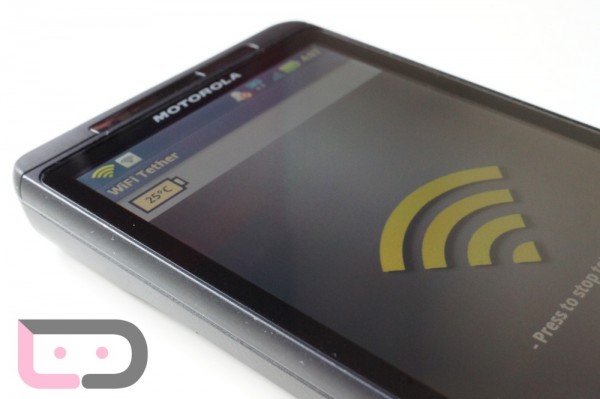

Oh baby. The blocking of tethering apps by Verizon just got very real after a complaint was filed today through the FCC by Free Press which could potentially impact the future of LTE. This has been one of those hot subjects around Droid Life over the last few weeks, so we couldn’t help but smile a little when we saw a group of this magnitude taking it straight to the top.
As you may recall, we first reported news that tethering apps had either been removed or purposefully blocked from being viewed and downloaded to Verizon devices. The move wasn’t necessarily a surprise since we know that Verizon likes to force you into purchasing an additional mobile hotspot service on top of your data plan, but the move was bold. And then just last week we noticed that even if you had managed to load up a third party app from outside the market to tether, that Verizon was blocking you from doing so.
People grew angry at this for a number of reasons – and the complaint filed today by Free Press pretty much touches on them all.
We pulled some points out to highlight the arguments they have given to the FCC over blocking tethering apps on LTE (which is where their arguments stands strongest):
- Verizon’s actions in cutting off access to tethering applications unlawfully “limit” and“restrict the ability” of its customers “to use the devices and applications of their choice.” This practice [blocking tethering apps] restricts consumer choice and hinders innovation regardless of which carrier adopts such policies, but when Verizon Wireless employs these restrictions in connection with its LTE network, it also violates the Federal Communications Commission’s rules. When Verizon purchased the spectrum licenses associated with its LTE network, it agreed that it would not “deny, limit, or restrict” the ability of its users to access the applications and devices of their choosing.
- Removing applications from the Android Market severely limits and restricts their distribution. Removing [tethering] applications from the Android Market severely restricts their use. [Meaning they are harder to find than other apps in the market, therefore are not as easily available as all apps should be.]
- Mobile broadband providers, including Verizon, offer their own expensive tetheringservices that compete with the free and low-cost options offered in the Android Market. Mobile broadband providers have a financial stake in limiting access to third-party tethering applications. As noted above, many tethering applications are available for free or for a modest fee. By contrast, when Verizon introduced the Droid, it charged $30 per month for tethering service on top of its $30 per month “unlimited” data plan.
I don’t know that I would get overly excited about this news just yet, but at the same time, we’ll all be wanting to pay close attention to how this unfolds. I will say though that not only would a ruling to either side by the FCC change the way data is handled on Verizon, it would also likely change the entire smartphone industry in the U.S.
Some thoughts that come to my mind immediately are:
- Let’s say the FCC tells Verizon it can no longer force us into mobile hotspot plans. What does that do to our monthly data bills? We were already expecting higher data prices this summer with LTE, but can you imagine what they would look like if tethering became uncontrolled?
- And what if the FCC says, “We think Verizon is fine in doing this.” Good bye tethering for life.
So, what do you guys think?
Via: Free Press [PDF], PCWorld
Cheers Corey!
This post was last modified on January 2, 2020 10:12 pm
